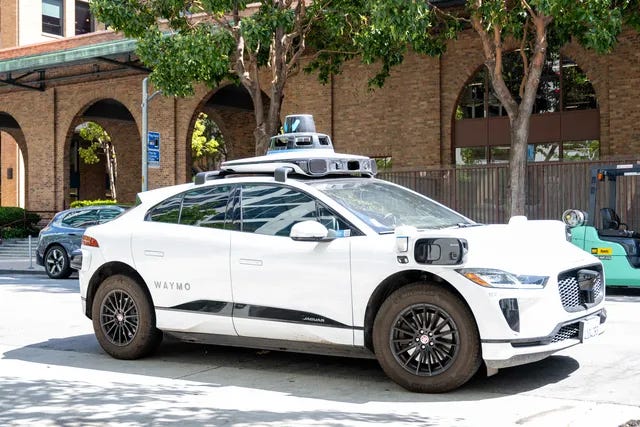Google's Robotaxi Service Waymo Democratized in San Francisco.
Waymo Opens Robotaxi Service to All San Francisco Users.
Introduction
Waymo, the autonomous vehicle company owned by Alphabet (Google's parent company), has made its driverless taxi service, Waymo One, available to all customers in San Francisco as of June 25, 2024. Previously, the service was limited to people who had signed up for a waitlist, which had nearly 300,000 people.
Service Expansion in San Francisco
Now, anyone in San Francisco can download the Waymo One app and hail a ride in one of Waymo's fully autonomous Jaguar I-Pace electric vehicles, available 24/7. San Francisco becomes the second U.S. city after Phoenix to have Waymo's robotaxi service open to the general public. This expansion marks a significant step in the company's goal to provide accessible and sustainable urban transportation.
Waymo's Operational Milestones
Waymo states its autonomous vehicles have driven over 3.8 million miles in San Francisco, delivering tens of thousands of rides per week. The company currently operates a fleet of about 300 robotaxis in the city. Nationally, Waymo has around 700 driverless cars operating in San Francisco, Los Angeles, Phoenix, and Austin.
Regulatory Approvals and Future Plans
In March 2024, California regulators authorized Waymo to expand its driverless operations to Los Angeles and the San Francisco Peninsula. The company plans to launch its service in Los Angeles and Austin later this year after completing public testing. This regulatory approval demonstrates confidence in Waymo's technology and safety measures.
Challenges and Safety Concerns
Despite its growth, Waymo faces challenges, including a recent safety probe by federal transportation officials into crashes and potential traffic violations by its robotaxis. The company insists it is committed to safety and stands by its performance, emphasizing collaboration with city and state officials, first responders, and road safety advocates to ensure its service benefits local communities.
Satinder Sartaaj Praises Driverless Taxi Experience in California
Satinder Sartaaj, renowned Punjabi singer and songwriter, recently shared a video on Twitter of his experience with a driverless taxi in Oakland, California. He expressed his amazement at the 21st-century technology, highlighting the precision and reliability of self-driving cars, especially in the bustling downtown of San Francisco. Sartaj lauded the innovation as the future of transportation and commended the hard work and research that has gone into this remarkable amalgamation of science and engineering. Additionally, he reminded his fans about his upcoming concert on Saturday, 29th June, at the Oakland Arena.
Impact on Urban Mobility
The opening of Waymo One to all customers in San Francisco is a significant milestone in the company's expansion of autonomous ride-hailing technology and urban mobility. With plans to launch in more cities, Waymo aims to make transportation more convenient, accessible, and sustainable. The company's strategy involves gradually and responsibly growing its service to ensure reliability and safety for all users.
Ownership and Equity of Waymo
Waymo, a subsidiary of Alphabet Inc., started as the Google Self-Driving Car Project in 2009 and became a separate entity under Alphabet in 2016. While Alphabet holds a majority stake, external funding rounds in 2020 and 2021 at a $30 billion valuation introduced minority investors. There are conflicting reports on employee equity, with some suggesting Waymo-specific stock and others indicating eligibility for Alphabet's equity incentive plan. As Waymo's technology advances, it is about time for Google's significant investment to yield substantial returns for its parent company, offering robust competition to Uber and Lyft.
Waymo's Expansion: Shifting the Discourse on Job Loss and AI
Waymo's decision to make its robotaxi service available to all San Francisco residents is a significant milestone in the autonomous vehicle industry. By expanding its operations and navigating regulatory challenges, Waymo is pushing the boundaries of urban mobility, setting the stage for a future where driverless cars become a common sight on city streets. Adding to this momentum, renowned Punjabi singer and songwriter Satinder Sartaaj has become an unexpected brand ambassador for Waymo. His enthusiastic Twitter post has quickly made Waymo a household name among the Punjabi diaspora, both in India and abroad, highlighting the global impact of this technological advancement.
In recent advancements in AI, concerns about potential job loss among skilled and semi-skilled workers in software and IT-enabled services have been prevalent. However, the advent of Waymo in the IT-cum-AI capital of the world should shift the discourse to evaluating the impact of potential job loss in manual jobs once considered immune to replacement by AI, until the advent of full-fledged robotics in everyday life. It is clear that the future is here and now, and we indeed live in interesting times.
If you believe this article would interest someone you know, please feel free to share it anonymously (for us), using any platform that you prefer.



